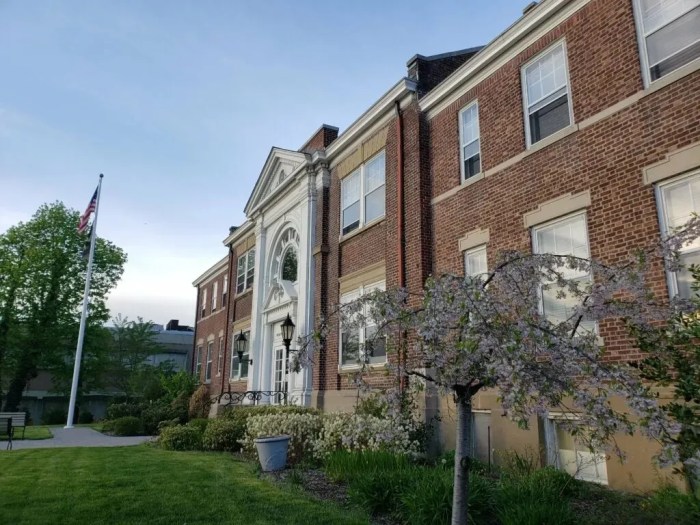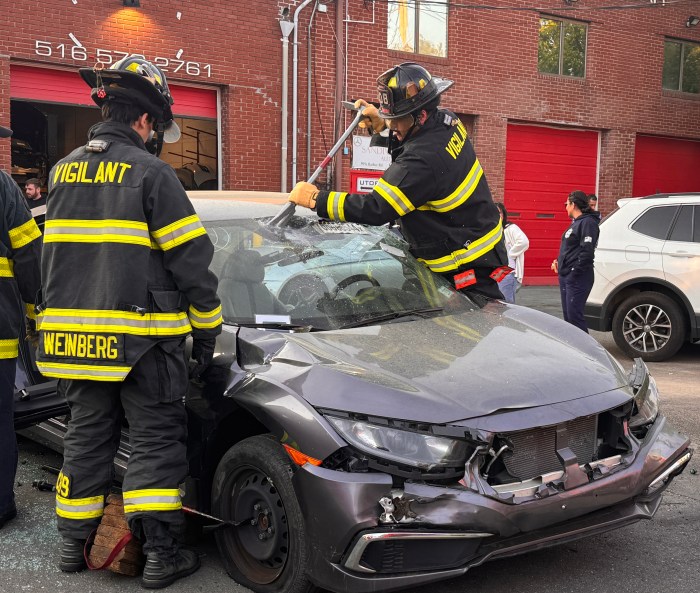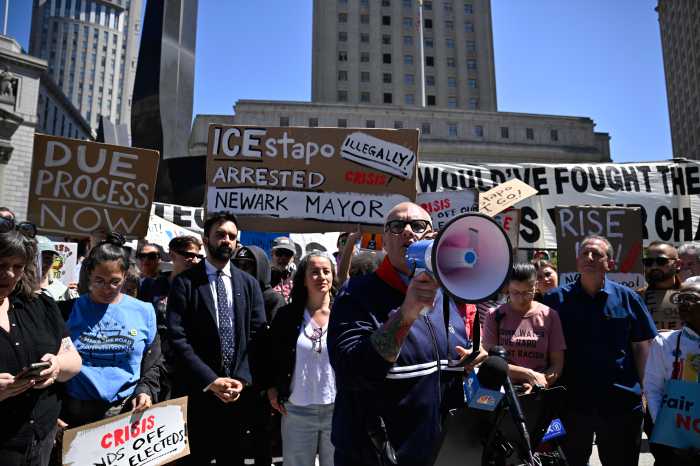This homeowner is outraged that her property on a quaint, quiet street is lit up like a Broadway stage

When Judy Youngblood searched for the perfect place to call home three decades ago, she chose to return to Great Neck where she grew up. Relocating from Manhattan, she looked for a lovely street, without sidewalks, away from the commotion, bright lights and noise pollution routinely found on main roads. Unlike residing on a brownstone-lined street in Manhattan where her view could eventually be obstructed by a newly built skyscraper, Youngblood thought she chose wisely. How could she have foreseen that her home would someday be bathed in light 24/7.
When LED streetlights were first being considered in the Village of Great Neck and she called to ask whether the light would bleed out from the roadway onto her property, she was told it wouldn’t. She questioned one of the workmen installing LED fixtures in her neighborhood, and he seemed to think the lights would illuminate the street only, shining from curb to curb.
Nonetheless, the glaring streetlight does invade her property, and Youngblood feels her nighttime has been stolen from her. In warmer weather, she can no longer look out her front windows at night to enjoy her breathtaking front garden. In winter when her plants are not in bloom, the reflection from the snow in her front yard is blinding.
She used to enjoy sitting peacefully on her porch in the evening. Since the light was installed on Dec. 8, 2017, she can no longer find peace on her porch. Her neighborhood now glows like a rest stop on a public highway.
After multiple unanswered calls and correspondence to the mayor, the village sent her a letter informing her that nothing could be done. They could not dim the light in front of her house consistently and could not add a shade, as promised.
On Feb. 7, 2018, Youngblood filed a summons and complaint in Supreme Court in Mineola against the Village of Great Neck, Mayor Pedram Bral, Deputy Mayor Barton Sobel, Trustees Anne Mendelson, Norman Namdar and Steven Hope, and Clerk-Treasurer Joe Gill, asking for an order restraining the defendants from turning on the streetlight outside her Colgate Road home.
Her court papers allege that installation of the streetlight across from her house constitutes private nuisance, violations of New York Public Law, fraud, trespass and violations of her 14th Amendment rights.
Her papers amended on March 1 state the defendants “falsely assured the residents the light would be mild and non-intrusive” when they announced the initiative to install new lights throughout the Village of Great Neck.
Youngblood’s lawsuit asserts, “…many residents complained that the lights were extremely bright and shining into people’s homes with unreasonable intensity at night,” and other residents provided supporting statements to the court.
The court documents state that the defendants ignored these protestations and continued to install the lights throughout the village.
Youngblood’s court papers explain that she has been unable to sleep and the glaring light from the LEDs are painful to her eyes.
In her complaint, Youngblood sought to restrain the village permanently from shining the LED streetlight onto her property.
The village filed a motion to dismiss Youngblood’s case, rejecting all of the causes of action she alleged. The village argued “granting of plaintiff’s application would raise significant public-policy concerns; if the village is to be ordered to turn off individual streetlights because those lights annoy individual neighbors, doing so could result in an unsafe condition to the general public.”
On Aug. 14, Judge Denise Sher denied Youngblood’s request for a temporary restraining order that would prevent the light from shining onto her property during the court case. At the same time, the judge denied the village government’s motion to dismiss Youngblood’s case. The judge found the allegations against the village were sufficient for the case to proceed on the issues of fraud, nuisance, federal civil rights violations without due process of law, violations of public buildings law and permanent injunction.
Although Judge Sher denied Youngblood’s request for a temporary restraining order to have the village turn off the light during the court case, the judge also denied the village government’s motion to dismiss Youngblood’s request for a permanent injunction. The judge dismissed only one of Youngblood’s seven legal arguments—her claim of trespass.
A preliminary conference was held on Oct. 1 for “discovery,” the pretrial disclosure of pertinent facts and documents from the village. Since March 2018, Youngblood’s attorney has been trying to obtain copies of the recordings of Board of Trustees meetings when the village government made the empty promise that shields would be available to shade all the streetlights. The village has not produced these tapes in seven months, and Youngblood’s outstanding discovery demands became the topic at the Oct. 1 conference. The judge mandated that the village produce the tapes within 30 days.
Youngblood’s fraud allegation rests on the supposition that the mayor and trustees misrepresented the availability of shields, since a shield cannot be affixed to block light to the opposite side of the street.
Of the 145 streets in the village, about 850 new LED streetlights replaced the old incandescent carriage lights that once graced the Village of Great Neck.
In her decision, the judge refused to dismiss the Youngblood lawsuit. The village responded by making a motion asking the judge to reconsider her decision. Paperwork is due in Supreme Court in Mineola on Oct. 18. The case will proceed from there.
































